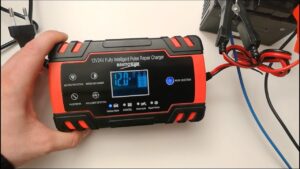Car battery terminals are prone to corrosion, but why does this happen? The answer is quite simple. Corrosion occurs when the metal terminals of a car battery react with the sulfuric acid in the battery, creating a layer of corrosion on the surface. This can lead to a variety of problems, including poor electrical conductivity and difficulty starting your car. But fear not, there are solutions to combat this issue and keep your battery terminals corrosion-free. In this article, we will explore the reasons behind car battery terminal corrosion and provide you with practical tips to prevent and address this common problem. So, let’s dive into the fascinating world of car battery maintenance and understand why do car battery terminals corrode.
Why Do Car Battery Terminals Corrode?
Car battery terminals play a crucial role in the overall performance and functionality of a vehicle’s electrical system. However, over time, these terminals can become corroded, leading to a range of issues and potential breakdowns. In this article, we will explore why car battery terminals corrode, the factors that contribute to corrosion, and effective ways to prevent and address this problem.
The Science Behind Corrosion
To understand why car battery terminals corrode, it’s important to grasp the science behind corrosion. Corrosion is an electrochemical process that occurs when two different metals are in contact with an electrolyte solution, such as the acid inside a car battery. This process generates an electrical current, which leads to the degradation of the metal surfaces.
Factors Contributing to Car Battery Terminal Corrosion
Several factors contribute to the corrosion of car battery terminals. By understanding these factors, you can take proactive measures to prevent or minimize corrosion. Let’s take a closer look at each of these factors:
1. Acid Leakage
One of the primary reasons for car battery terminal corrosion is acid leakage. Over time, the battery’s acid can escape from the battery and come into contact with the terminals. This acid, combined with moisture in the air, creates an ideal environment for corrosion to occur.
2. Condensation
Condensation is another factor that accelerates battery terminal corrosion. When the temperature fluctuates, moisture can accumulate on the terminals. The presence of moisture, along with the ambient humidity, facilitates the corrosion process.
3. Dirt and Debris Accumulation
Dirt, dust, and other debris that accumulate on the battery terminals can create a conductive path for electrical current, further accelerating corrosion. These contaminants trap moisture and promote the chemical reactions that degrade the metal surfaces.
4. Electrolysis
Electrolysis refers to the process in which an electric current passes through a conductive material. In the case of car batteries, stray electrical currents can flow through the terminals, intensifying the corrosion process. This stray current can be caused by faulty wiring, electrical system malfunctions, or even nearby electronic devices.
5. Overcharging
Overcharging a car battery can also lead to terminal corrosion. When a battery is overcharged, excessive hydrogen gas is produced. This gas combines with oxygen in the air to form water vapor. The presence of water vapor around the terminals increases the likelihood of corrosion.
Effects of Car Battery Terminal Corrosion
Car battery terminal corrosion can have several negative effects on a vehicle’s electrical system and overall performance. Some common effects include:
1. Poor Electrical Connections
Corrosion on the battery terminals can hinder the flow of electricity, resulting in poor electrical connections. This can lead to various issues, such as dimming headlights, slow cranking, malfunctioning electrical components, and even starting problems.
2. Voltage Drops
When the battery terminals are corroded, the resistance to electrical flow increases. This resistance causes voltage drops, reducing the overall effectiveness of the electrical system. As a result, the vehicle’s performance may be compromised, and it may struggle to operate optimally.
3. Battery Failure
Severe corrosion on the terminals can eventually lead to battery failure. The compromised electrical connections and increased resistance can strain the battery, reducing its lifespan and overall capacity. Ultimately, this can result in a dead or non-functional battery.
Preventing Car Battery Terminal Corrosion
While car battery terminal corrosion is inevitable to some extent, there are several preventive measures you can take to minimize the risk. By implementing these practices, you can extend the life of your battery and maintain a reliable electrical system. Here are some effective prevention strategies:
1. Regular Cleaning
Maintaining clean terminals is essential for preventing corrosion. Regularly inspect the battery terminals and remove any dirt, debris, or corrosion using a battery cleaning brush or a mixture of baking soda and water. Be sure to disconnect the battery cables before cleaning to avoid electrical mishaps.
2. Applying Anti-Corrosion Products
After cleaning the battery terminals, apply an anti-corrosion spray or a thin coating of petroleum jelly to protect the metal surfaces. These products create a barrier between the terminals and the electrolyte, reducing the likelihood of corrosion.
3. Insulating Terminals
Another effective preventive measure is to insulate the battery terminals. You can use terminal protectors or terminal covers made of rubber or plastic to shield the terminals from moisture, dirt, and other contaminants. These insulating materials help minimize the chances of corrosion.
4. Checking Battery Acid Levels
Ensuring that the battery acid level is within the manufacturer’s recommended range can also help prevent terminal corrosion. Low acid levels can result in an increased risk of acid leakage, which can corrode the terminals. Regularly check and maintain the proper acid levels to avoid this issue.
5. Fixing Electrical System Issues
Addressing any electrical system issues promptly is crucial in preventing stray currents that can accelerate corrosion. If you notice any faulty wiring, malfunctioning electrical components, or excessive current draw, consult a professional to resolve the problem.
In summary, car battery terminal corrosion is a common problem caused by factors such as acid leakage, condensation, dirt accumulation, electrolysis, and overcharging. This corrosion can lead to poor electrical connections, voltage drops, and even battery failure. However, by understanding the causes and effects of corrosion and implementing preventative measures like regular cleaning, applying anti-corrosion products, insulating terminals, checking acid levels, and fixing electrical system issues, you can minimize the risk of car battery terminal corrosion and ensure a reliable electrical system for your vehicle.
Frequently Asked Questions
Why do car battery terminals corrode?
Car battery terminals corrode primarily due to a chemical reaction between the materials present in the battery and the surrounding environment. This reaction is accelerated by factors like moisture, heat, and exposure to corrosive substances. Here are some frequently asked questions regarding this issue:
What causes car battery terminals to corrode?
Car battery terminals corrode due to a chemical process called electrolysis, which occurs when the battery is in use. The sulfuric acid in the battery reacts with the lead in the terminals, causing a chemical reaction that results in the formation of corrosion.
How does moisture contribute to battery terminal corrosion?
Moisture acts as a catalyst for the corrosion process. When water or humidity comes into contact with the corrosive substances on the battery terminals, it speeds up the chemical reaction, leading to the formation of corrosion.
Are extreme temperatures a factor in battery terminal corrosion?
Yes, extreme temperatures can contribute to battery terminal corrosion. High temperatures can accelerate the electrolysis process, causing the battery to generate more heat and increasing the likelihood of corrosion. Similarly, low temperatures can hinder the battery’s ability to recharge fully, leading to acid buildup and corrosion.
Can dirty or contaminated battery terminals cause corrosion?
Dirty or contaminated battery terminals can indeed contribute to corrosion. When dust, dirt, or other pollutants accumulate on the terminals, they create a barrier that traps moisture and other corrosive substances, intensifying the reaction and leading to the formation of corrosion.
How can I prevent battery terminal corrosion?
To prevent battery terminal corrosion, you can take several measures. Regularly cleaning the terminals with a mixture of baking soda and water can help remove any existing corrosion. Applying a thin layer of petroleum jelly or terminal protectant spray after cleaning can create a barrier against moisture and corrosive substances. Additionally, ensuring the battery is securely tightened and properly maintained can minimize the risk of corrosion.
Final Thoughts
Car battery terminals corrode due to several factors. Firstly, the reaction between the battery’s sulfuric acid electrolyte and the metal terminals leads to the formation of lead sulfate, a white, powdery substance that contributes to corrosion. Secondly, exposure to environmental elements such as moisture and humidity accelerates the corrosion process. Additionally, the presence of impurities and contaminants on the terminals further promotes corrosion. Regular maintenance, including cleaning the terminals and applying a protective grease, can help prevent or minimize this corrosion. By understanding why car battery terminals corrode, we can take proactive steps to ensure optimal battery performance and longevity.



